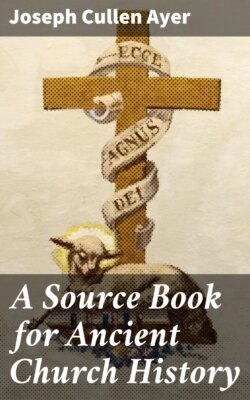Читать книгу A Source Book for Ancient Church History - Joseph Cullen Ayer - Страница 30
На сайте Литреса книга снята с продажи.
(a) Papias, in Eusebius, Hist. Ec., III, 39. (MSG, 20: 300.)
ОглавлениеPapias, from whom two selections have been taken, was bishop of Hierapolis in Phrygia during the first part of the second century. He was, therefore, an elder contemporary of Justin Martyr. His work, The Exposition of the Oracles of the Lord, has perished, with the exception of a few fragments. The comments of Eusebius in introducing the quotations of Papias are characteristic of the change that had come over the Church since the post-apostolic period. That Papias was not to be regarded as a man of small power simply because he held chiliastic ideas is sufficiently refuted by the fact that Justin Martyr falls but little behind Papias in extravagance of expression.
“I shall not hesitate, also, to set in order for you with my interpretations whatsoever things I have ever learned carefully from the elders and carefully remembered, guaranteeing the truth of them. … For I did not think that what was to be gotten from the books would profit me as much as what came from the living and abiding voice. …” The same writer gives also other accounts which he says came to him [pg 026] through unwritten traditions, certain strange parables and teachings of the Saviour and some other more mythical things. Among these he says that there will be a period of some thousand years after the resurrection of the dead, when the kingdom of Christ will be set up in a material form on this very earth. I suppose he got these ideas through a misunderstanding of the apostolic accounts, not perceiving that the things said by them were spoken mystically in figures. For he appears to have been of very limited understanding, as one can see from his discourses, though so many of the Church Fathers after him adopted a like opinion, urging in their support the antiquity of the man; as, for instance, Irenæus and any one else that may have proclaimed similar views.
